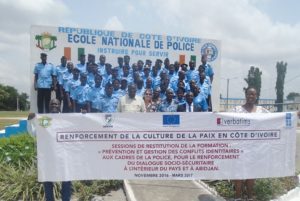… EDUCATION FOR PEACE …
An article by Daniel Assouman for Fraternité Matin (translated by CPNN)
In order to strengthen socio-security dialogue, the National Police School has strengthened the operational capacities of police officers. The program of five months was initiated by the Director General of the National Police, Kouyaté Youssouf..

(Click on photo to enlarge)
The director general of the national police, Commissary Major, Kouyaté Youssouf, plans to strengthen the dialogue within the institution and also between the police and the population, in order to guarantee security.
To this end, he has signed a partnership with “Verbatims”, a training and support institute for the prevention of conflicts related to identity. By means of 24 refresher and training sessions, 639 police officers, including 79 women and police of all ranks, received capacity building on culture of peace techniques.
These sessions, which began in November 2016 and ended on March 10, 2017, were structured around six modules. These included:
* the notion of ethnicity,
* prejudices and stereotypes,
* identities and conflicts at the micro-social level,
* identities and conflicts at the macro-social level,
* the notion of nationality,
* elections and political candidacies
(Article continued in right column)
Where are police being trained in culture of peace?
(Article continued from left column)
Marie Stenbock-Fermor, Chair of the Verbatims Board of Directors, recalled that the Project, called “Support the Strengthening of Socio-Security Dialogue” (Pards) is financed by the European Union and Implemented by the United Nations Development Program (UNDP). Its general goal is to bring the police and the population closer together, in particular, through the organization of police-population dialogue workshops and public forums in order to reduce considerably the mistrust between the population and the police.
During the course of the work, the participants concentrated on reflections on the internal cohesion of the police and the image of the police within the population, according to the Marie Stenbock-Fermor. With regard to internal cohesion, she noted that within the police some deviant behaviors were observed by the hierarchy. For example, questioning colleague with regard to ethnicity and mentioning ethnic prejudices and stereotypes.
According to her, these behaviors that stem from different crises are sources of frustration, mistrust, contempt, withdrawal, fear between colleagues and they severely harm the efficiency of service to the population. That is why she found it necessary to carry out the training.
Returning to the image of the police within the population, she was reassuring. She pointed out that through training, there will be a real improvement in respect for the police by the population., especially to the extent that they perceive new behaviors on the part of the police officers both in terms of reception of complaints and treatment of persons who have committed offenses.
The Director of Training and the National Police School, Chief Police Commissioner Touré Kouacou Albert, who represented the Director General of the National Police, urged the participants to put into practice what had been learned . He transmitted the encouragement of the Director General of the National Police.